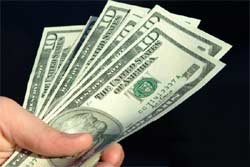US firms using loopholes to pay little or no tax
15 Apr 2016
American companies are sharply under the scanner for the way they avoid paying taxes. A US government report revealed on Wednesday that a significant percentage of large, profitable corporations pay no federal taxes at all; while a study released on Thursday gives fresh insights into some of the practices that make those light tax burdens possible.
 The 50 largest US corporations currently stash about $1.4 trillion in offshore tax havens, according to an analysis by anti-poverty group OxFam America.
The 50 largest US corporations currently stash about $1.4 trillion in offshore tax havens, according to an analysis by anti-poverty group OxFam America.
Between 2008 and 2014, these titans of big business - a group that includes Apple, Coca-Cola and Disney - together received approximately $27 in federal loans or similar aid for every $1 they paid in federal taxes, OxFam America calculated.
Altogether, the 50 biggest companies' overseas tax avoidance techniques allowed them to pay an effective corporate income tax rate of 26.5 per cent during those years, the non-profit estimates. That is well below the official top rate of 35 per cent.
Released just days before the deadline for Americans to file their tax returns, ''Broken at the Top'' seeks to expose how corporate tax dodging limits global governments' ability to address poverty.
''The vast sums large companies stash in tax havens should be fighting poverty and rebuilding America's infrastructure, not hidden offshore in Panama, the Bahamas, or the Cayman Islands,'' OxFam America president Raymond Offenheiser said in a statement accompanying the study.
OxFam America relied primarily on data from the companies' annual financial filings to the Securities Exchange Commission.
Other organisations have come up with slightly different numbers using similar research methods. A March study from the liberal Citizens for Tax Justice found that the 500 largest corporations are holding $2.4 trillion overseas, allowing them to avoid paying $695 billion in taxes.
There are a number of ways that American companies can legally offshore their profits to countries with lower tax rates. Technology and pharmaceutical companies, for example, often create subsidiaries in tax havens like Bermuda, to which they transfer the intellectual property and patents that earn them a large share of their total profits. Companies whose workforces and sales are primarily in the US and other high-tax nations can then claim that a disproportionate share of their profits were earned overseas.
'Inversion' under fire
Another tactic that has grown more popular in recent years, but which has also come under increased scrutiny, is corporate inversion. American companies that ''invert'' acquire foreign firms in order to reincorporate in lower-tax countries.
OxFam America's report could add to the recent uptick in public awareness of corporate tax avoidance and the pressure on policymakers to address it. The release of the Panama Papers, a leaked cache of documents from a Panamanian law firm, made waves earlier this month by exposing the elaborate tax-dodging schemes of the super-rich.
President Barack Obama cited the Panama Papers while touting a new Treasury Department rule aimed at curbing corporate inversions.
Defenders of corporate tax strategies blame the official US corporate tax rates, which are among the highest in the world. The United States, they note, is also one of the few countries that taxes foreign earnings at domestic rates. A ''territorial'' system in which profits are taxed at the rates of the countries where they are earned is more common.
But thanks to a tax ''deferral'' loophole, US companies only pay domestic taxes on foreign earnings if they ''repatriate'' the earnings by bringing them back to the US. That gives companies a particular incentive to hoard money elsewhere - sometimes indefinitely - in order to defer taxation.
Obama has proposed a framework for corporate tax reform that would embrace lower rates and fewer loopholes with the goal of at least maintaining current revenue levels from corporate taxes - and increasing corporate investment at home.
''Whether you are a liberal or a conservative, you want to get that tax rate down,'' said Martin Sullivan, chief economist at the tax news and analysis website Tax Analysts.
''If the Obama administration, which I think has been the most aggressive of any administration in recent history in trying to shut down this problem,'' does not think it can be solved through enforcement alone, and no president will, Sullivan argued.
Many progressive fair taxation advocates, however, contend that the government can and should rely solely on closing corporate tax loopholes to bring companies into line and replenish federal coffers.
Bob McIntyre, director of Citizens for Tax Justice, said one simple way to do that would be to end the foreign tax deferral loophole that allows companies to avoid domestic taxes until they repatriate the earnings. That way they would have to pay domestic taxes on foreign profits even if they are holding it elsewhere.
Democratic presidential candidate Sen Bernie Sanders has made the change part of his campaign platform.
To stop inversions, McIntyre suggested, the government could force companies to pay a so-called exit tax before leaving the US, taxing the profits they had earned overseas up to that point. Hillary Clinton, Sanders' rival for the Democratic presidential nomination, backs that idea.
McIntyre rejects the notion of lowering corporate taxes to compete with lower tax nations.
''The main purpose of tax reform should be to fund the government, and anything else is just a waste of time,'' he concluded.


















